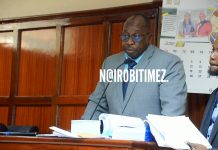 Justice Isaac Lenaola who ruled bill asserted by former President Mwai Kibaki giving retired presidents millions and monthly allowances as illegal.
Justice Isaac Lenaola who ruled bill asserted by former President Mwai Kibaki giving retired presidents millions and monthly allowances as illegal.
BY SAM ALFAN.
14 days to the end of former President Mwai Kibaki’s term, he assented into law a legislation requiring that retired presidents be given a hefty pay of Sh16.8 million, a Sh560,000 monthly pension and allowances totaling Sh13 million annually.
The law also included a package for the Deputy President and Designated State Officers, which would have given MPs Sh9.3 million send-off benefits.
According to the court, the entire legislation is void because law makers did not consult the Salaries and Remuneration Commission (SRC) when drafting and enacting the Presidential Retirement Benefits (Amendment) Act No. 9 of 2013.
Justice Isaac Lenaola found that the National Assembly did not follow the law requiring SRC to be involved when issues of remuneration and retirement of State officers are involved.
President Uhuru Kenyatta however declined to sign it into law the bill citing inconsistencies.
Enforcement of the law would have made taxpayers part with at least Sh2 billion yearly.
“To my mind, however, while I do not question the legislative power of the National Assembly, I am certain that the law mandated it to seek the input of the SRC as it is the body mandated in reviewing the salaries and remuneration of State officers including the pension of a retired President. It ought at the very least to have obtained its recommendation or consult it before embarking on its legislative mandate,” Justice Lenaola said on Friday.
“This Court does not therefore have any other option but to fault the Presidential Retirement Benefits (Amendment) Act for the failure of Parliament to involve the SRC,” he added.
The sendoff package was initially contained in amendments to the Finance Bill 2012, but the law makers pulled it into The Retirement Benefits (Deputy President and Designated State Officers) Bill 2012 last week after the first rejection. In this, the
The legislation caused uproar among Kenyans and also prompted the Kenya National Human Rights Commission to sue the Attorney General and President Kibaki, saying the law as assented was inconsistent with the Constitution.






